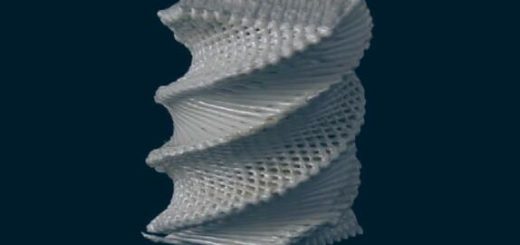Stratasys Partners With ECCO to Innovate Footwear Manufacturing Using 3D Printing Technology
November 15, 2021, a leader in polymer 3D printing solutions, announced that Danish shoe manufacturer ECCO is using Stratasys Origin One® 3D printing technology to accelerate product development, allowing conceptual footwear samples to be reviewed early in the development cycle using 3D printed molds and lasts (mechanical forms shaped like a foot) with resin materials from Henkel Loctite.
 ECCO accelerates product development by including Stratasys Origin One 3D printers and materials by Henkel Loctite in their shoemaking development process. (Photo: Business Wire)
ECCO accelerates product development by including Stratasys Origin One 3D printers and materials by Henkel Loctite in their shoemaking development process. (Photo: Business Wire)
Shoemaking is an incredibly manual process, but ECCO has worked to integrate innovative technologies into their shoemaking, allowing for increased automation and a more streamlined development process. One such innovation has been the Direct Injection Process (DIP). This process has given ECCO numerous benefits including an efficient and reliable method of securing the upper part of the shoe to the midsole.
To help further innovate shoemaking and the DIP, ECCO turned to additive manufacturing with the Origin One 3D printer using Stratasys’ proprietary P3™ technology. ECCO is using the printers in their Portugal and Denmark development facilities to 3D print molds and shoe lasts for development purposes that match the quality requirements of their CNC-machined aluminum counterparts. The molds and lasts, printed from a photopolymer from Henkel Loctite, are faster to produce, and the new process costs significantly less than CNC machining aluminum.
“Our innovative approach to footwear development and desire to put customer experience as a priority made additive manufacturing a logical next step in the evolution of our development process,” says Vice President of Research and Development at ECCO, Jakob Møller Hansen. “In our search to find the right partner, we tested a variety of 3D printers for surface quality, print speed, and accuracy. Among the printers we tested, the Stratasys Origin One was the 3D printer that best met our stringent requirements.”
“ECCO’s case is a great example of how the footwear industry is embracing additive manufacturing for functional shoe parts, which goes beyond typical applications like sport shoe cushioning,” says Chris Prucha, CTO of Production P3 for Stratasys and a co-founder of Origin. “We were able to collaborate with ECCO to provide a solution that allowed them to further innovate their processes and produce a quicker development workflow.”
Stratasys partnered with materials providers to test a variety of resins that would meet ECCO’s needs, choosing a formulation from Henkel’s Loctite 3D Printing that was formulated to meet the specific requirements of the DIP process. The combination of Stratasys Origin One 3D printing technology and custom Henkel materials has given ECCO the ability to create shoe molds that endure thousands of shots with zero visible degradation. Further, the quality of the shoe produced using additive manufacturing technology is on par with those produced using traditional CNC machined aluminum molds.
“Together with ECCO and Stratasys, we are on a journey to reshape the elements of footwear manufacturing with Loctite’s material innovation capabilities,” said Cindy Deekitwong, Global Head of Marketing, Henkel Adhesives’ Incubator Businesses. “With our ecosystem of partners in the market space, we are at the forefront of scaling additive manufacturing to its fullest.”
By 3D printing the DIP molds instead of machining them, a single pair of mold inserts can be printed overnight, significantly more cost-efficient than that of an in-house CNC machined pair of molds. This enables designers and developers to test functional shoes earlier in the development cycle, allowing product teams to confirm the fit and comfort of new styles. Further, branded customers can more easily place real production shoes, in more varieties, in the hands of their potential customers for feedback and pre-sale opportunities earlier in the shoemaking process. Finally, ECCO can now quickly produce mold inserts at the location that needs them, eliminating the need to ship heavy metal molds, reducing costs, and minimizing the risk of shipping delays or tariffs.
For the wider footwear industry that want to take advantage of 3D printed DIP tooling, ECCO has several flexible routes to market with the ability to assist with every aspect of footwear manufacturing and mold making including engineering, part production, or licensing of IP.
Source: Stratasys
For press release, welcome to send to 3D Science Valley at 2509957133@qq.com




Recent Comments